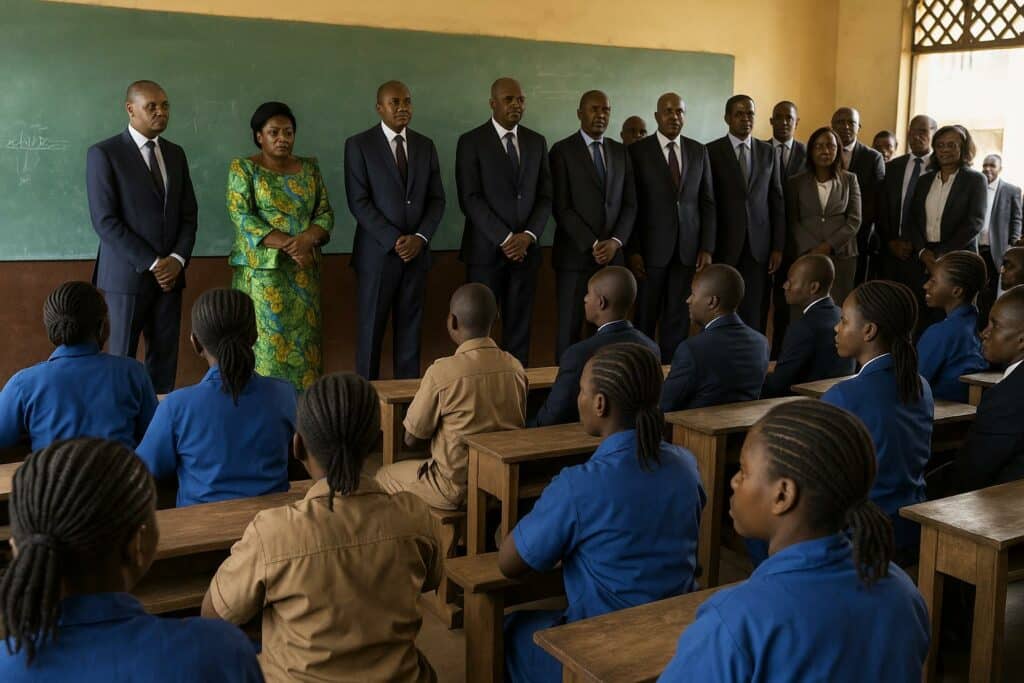Ministerial visit signals policy continuity
The bustle that animated the compound of Louis Ngambio Primary School on 10 November carried a resonance far beyond the neighbourhood of Mfilou. By walking through freshly painted corridors, Minister of Pre-school, Primary, Secondary Education and Literacy Jean Luc Mouthou reminded onlookers that infrastructure remains the concrete expression of the instructions issued by President Denis Sassou Nguesso. The minister’s inspection of the newly minted public General Education College bore a dual message: the facility is officially operational, and its vocation is to anchor lower-secondary learning within the community that needs it most.
Bringing classrooms closer to families
Parents in Mfilou had long resigned themselves to seeing their children undertake tiring commutes toward distant collèges, sometimes across congested quarters of Brazzaville. “Many did not grasp that a secondary wing already existed within Louis Ngambio,” the minister conceded at the end of his tour. His declaration served less as a reproach than as an invitation: enrol your sons and daughters here instead of dispatching them to far-flung establishments. The proximity of the new college is expected to trim transport costs, mitigate lateness and enhance pupils’ security—concerns frequently raised at school-board meetings.
From sixth form to brevet: a phased roll-out
The ministry’s blueprint envisions a complete first-cycle secondary syllabus, stretching from sixième to troisième, within the same compound. For the 2025-2026 academic year, two levels—sixième and cinquième—will open their doors, absorbing 517 learners distributed across five classrooms. Jean Luc Mouthou pledged to “surmount forthcoming difficulties with all our heart” and to expand the facility until pupils can sit for the Brevet d’Études du Premier Cycle without leaving their arrondissement. His tone suggested that budget outlays for additional rooms, laboratories and pedagogic resources have already been earmarked, even if detailed figures were not disclosed during the visit.
Community endorsement strengthens ownership
Narcisse Ngabanou, president of the Mfilou branch of the Association des Parents d’Élèves et Étudiants du Congo (APEEC), recalled a September meeting at which the minister had unveiled the project. Today, he describes the finished structure as a “source of great satisfaction” for guardians and students alike. Local APEEC committees often act as barometers of public sentiment; their support, therefore, augurs well for enrolment rates and for the upkeep of the premises. The official partnership between the ministry and parents’ federation also exemplifies the participatory governance model encouraged in recent sectoral plans.
Infrastructure as a lever for equitable learning
Beyond bricks and mortar, the Louis Ngambio College embodies an educational philosophy that seeks to deliver quality teaching within an environment that nurtures both curiosity and discipline. Government communiqués repeatedly frame such projects as investments in the “future elites of the Republic”. By allocating resources to suburban districts, authorities aim to lessen disparities between urban centres and peripheral zones and to consolidate the right to schooling set out in national legislation. As the first cohort files into its classrooms, the success of the endeavour will be measured not merely by occupancy rates but by exam results, retention figures and the sense of belonging cultivated among Mfilou’s youth.

